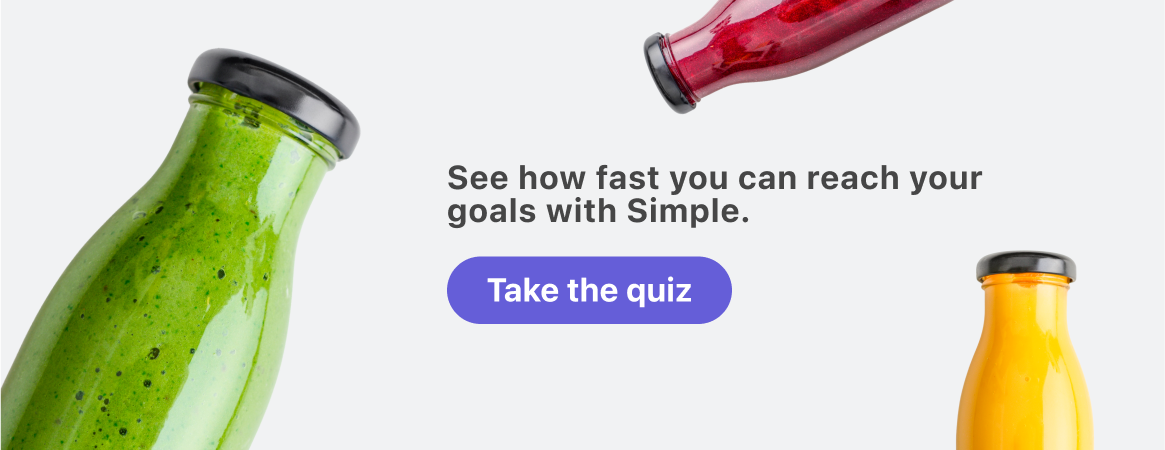
Fact checked Before we hit “publish,” our science team needs to be 100% satisfied that we’re giving solid advice based on high-quality, reliable, scientifically-sound research.
Editorial guidelines At Simple, we use our nutrition and wellness expertise to give you actionable content that helps you achieve your goals, overcome challenges, and increase your well-being.
Table of contentsThere are many ways to adjust your diet or the way you eat. Ever tried mixing up your meal times with intermittent fasting? We’re big fans of that method around here. Another increasingly popular approach is plant-based eating, which is good not only for your health but also for the planet.[1,2]

Maybe you’ve been “ride or die” for the plant-based life long before it became a thing, or maybe you’re just beginning to be curious about it and other ways of eating that may yield some health benefits. Whether you want to lose weight, improve your cholesterol or blood sugars,[3] or are just looking for ways to feel healthier, your search has brought you here to our little mashup of intermittent fasting as a vegetarian! Don’t worry, we’ll guide you down this rabbit hole and make sure you come out with all the information you need to make the right choice for you!
Plant-based, vegetarian, and vegan are three different levels of plant-forward or plant-focused eating.[3] The reason behind your choice to include more plants in your day may determine which level you land on.
Plant-based: The majority (80%–90%) of your meal would come from plants and plant-based foods, such as fruits, vegetables, grains, legumes, seeds, and nuts. The other 10%–20% can still be meat. This way of eating a meal is usually chosen for the health benefits.
Vegetarian: There are a few different ways of eating as a vegetarian. A vegetarian meal is different from a plant-based meal because it does not include meat. It can, however, include animal products such as dairy, eggs, and fish (if you’re a pescatarian). The motive for choosing this level usually falls somewhere between health and ethical reasons.
Vegan: This way of eating eliminates all animal products — and not just in food. Outside of meal choices, it is truly a lifestyle that includes not using animal products for clothes, shoes, or other consumer products. It is usually chosen more for ethical and environmental reasons than for the health benefits.
The best thing about fasting is that it’s adjustable to any diet and lifestyle. This means it can be coupled with diets like veganism or vegetarianism — yes, vegan intermittent fasting is a thing, too! Remember, fasting is more about when you eat in a day rather than what you eat, so they can work together toward the same goals. They both offer benefits, but both can also pose some risks. Let’s break down the pros and cons.
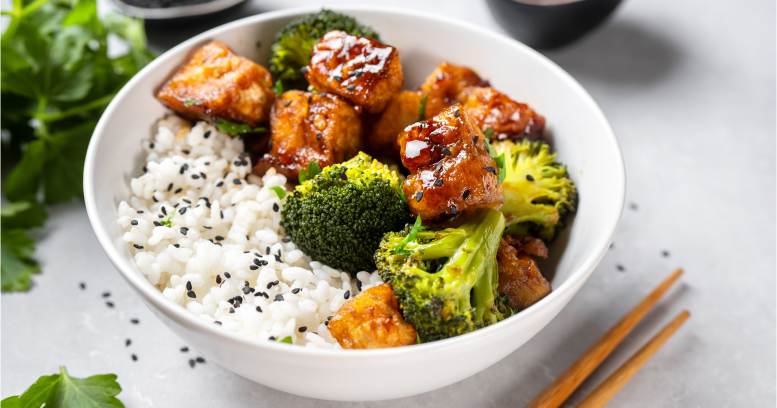
Intermittent fasting and eating a vegetarian diet have similar benefit profiles, so it only stands to reason that they could help amplify each other.
A vegetarian diet includes fruits, vegetables, whole grains, legumes, and healthy fats — in other words, fiber, fiber, fiber, and much less saturated fats and cholesterol. Coupled with intermittent fasting’s ability to promote weight loss, help lower blood pressure, and improve lipid markers,[4] it all points to an unblocked, unstressed heart that’s living its best life.
The high fiber content of a vegetarian diet helps increase satiety, meaning you get full faster and stay full longer.[5] It’s kind of a way to hack hunger while fasting. This also helps with blood sugar control and reduces insulin response — that pesky fat-storing hormone.[6] This can prevent you from overeating during your eating window and keep you full longer during your fasting window, making the day a little easier to get through and further supporting your weight loss efforts.
Not only are plants high in fiber, but they also have phytochemicals [7] and antioxidants such as vitamins C and E. A diet with a high intake of these anti-inflammatory foods has been shown to reduce the risk of cancer and prevent chronic diseases like type 2 diabetes and cardiovascular diseases from developing.[8] Sound familiar? If you’ve been hanging out with us for a while, it should. These are some of the same benefits seen from intermittent fasting.
If you’re new to us and are intrigued by these benefits, once you’re done here, may we recommend you take a little more time out of your day to pop over and check out our Simple quiz.
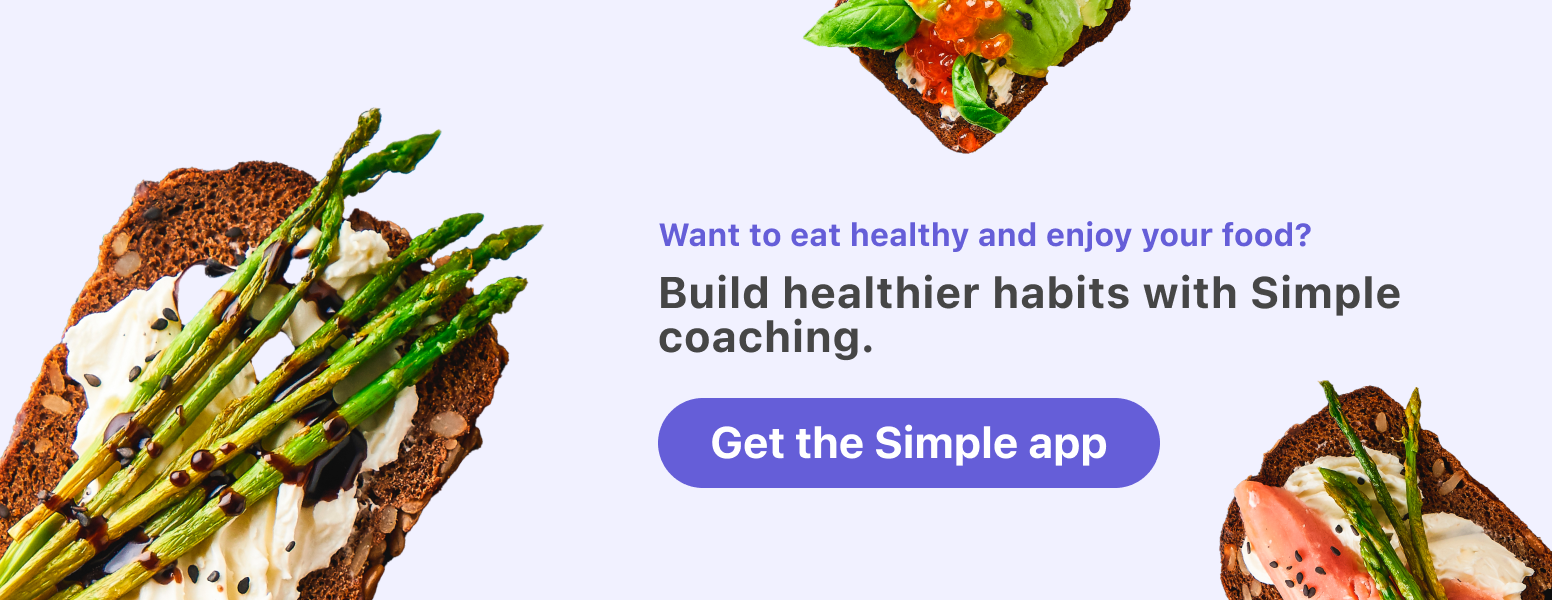
Although vegetarian intermittent fasting seems like this flawless power duo of a healthy lifestyle, and you’re thinking, “My doctor will be so impressed once I lose all this weight and fix my labs …where has this been all my life?” — hold on a sec before you go all in, we want to make sure you know the risks.
Let’s start with who we recommend to avoid fasting altogether.
We believe that the risks of fasting outweigh the benefits for people who fit into these categories.
OK, now let’s look at the possible risks for those who are able to practice vegetarian fasting safely.
You can get all of your nutrients for the day from plant-based foods, but some nutrients are more naturally available in meats and meat-based foods. Some of these nutrients include:
Intermittent fasting can further limit these for vegetarians by limiting the time in the day available to consume enough foods. This leads us to the next risk of a vegetarian fast diet…
While vegetarian foods tend to be more nutrient-dense, they also tend to be lower in calories, meaning it could take more volume to meet your energy needs. Pairing this with a limited amount of time per day to get those calories in can make adequate intake much harder for some people. This can lead to unwanted outcomes,[13] including weight and muscle loss, plus you may have a harder time gaining muscle and experience decreased energy levels — generally not the intermittent fasting results we’re looking for.
If you’ve been a vegetarian for a while, you’re probably already used to the challenge of finding vegetarian-friendly meals at restaurants and social events. Maintaining your social calendar can also be a challenge for intermittent fasting, but a challenge that can be met by planning ahead for your day. Luckily, intermittent fasting comes in many shapes and sizes. A shorter fasting schedule is a good place to start with intermittent fasting for beginners. Learning how to adjust your vegetarian intermittent fasting meal plan is key to not feeling limited and possibly frustrated while trying to maintain your social life and your new lifestyle. We have lots of tools, tips, and resources to help you minimize intermittent fasting mistakes. To get started, take our Simple quiz.

OK, we’ve given you the nitty-gritty; now you’re ready to get started. With any nutrition or lifestyle change, we recommend you check in with your doctor first.
We also recommend taking it slow. Making many changes at once can be hard to sustain. It can also make it hard to pinpoint what may or may not be agreeing with you and your lifestyle.
We recommend starting with your natural fasting time, i.e., when you’re asleep, then add an hour or two at a time. You can adjust as needed and work up to your fasting happy place. For example, if you naturally stop eating around 8 PM and won’t eat breakfast until 8 the following morning, consider stopping your intake around 6 or 7 PM for a 13–14 hour fast. If family dinners or time out with friends doesn’t fit in with that change, you can add on an hour or two at the start of your day instead. Remember, you adjust fasting to fit you, not the other way around.
Starting slow can help you avoid or minimize intermittent fasting side effects. Our heavyweight champ around here is the 16:8 schedule (fasting for 16 hours and eating during an 8-hour window). But, if 16 hours is too much for you, you can still see many or all of the benefits of fasting with shorter windows (12:12, 14:10 — or any other combination that works for you). Yes, even some weight loss.
With all of your changes, take note of how you feel, and don’t be afraid to adjust as needed. Having an intermittent fasting meal plan, knowing what breaks a fast, what you can drink while fasting, and what to eat during intermittent fasting are all keys to your success. Of course, you don’t have to go far to find all of that; we’ve got you covered!
A balanced vegetarian meal plan should include lots of choices from these food groups:
Depending on what type of vegetarian you decide to be, you can also include protein from fish, eggs, and dairy, including yogurt and dairy milk.
When shopping for fresh, whole vegetarian foods, think (whenever possible) culturally — what foods are important to you; locally — shop farms and farmer’s markets; and in season — when produce is at its tastiest, most nutrient-dense, and often cheapest. But don’t let it hinder you from reaching your goals if you need to choose frozen or canned foods. They can just as easily be a part of a health-promoting meal plan. Here’s a 7-day meal plan for intermittent fasting with a vegetarian twist to get you started.
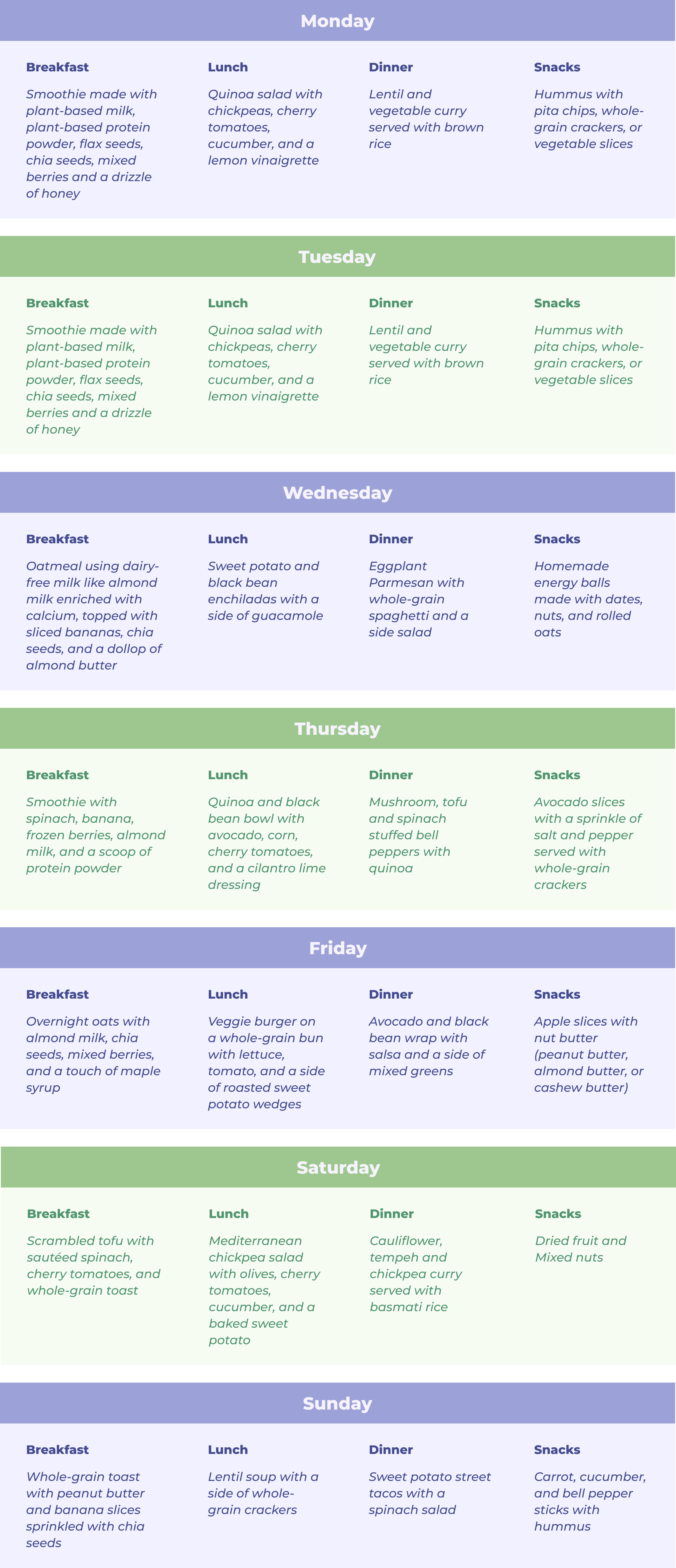
Remember, this is just a guideline to get you started. You can change it up as needed, including adding in foods like eggs, cheese, yogurt, and fish if you choose to include them in your diet.
There you have it, all things intermittent fasting as a vegetarian, including a meal plan. Did we have your back or what?
Do you have to fast to be successful as a vegetarian or vice versa? No, of course not! But if the combination of intermittent fasting with a vegetarian diet plan is something you can follow for your life and goals, we love it for you, and we’re here to support you! Remember that you can also get support from your healthcare provider for ongoing personalized advice, especially if you have any concerns about your intake of vitamins and minerals. A great place to get started is our Simple quiz. With a good plan in place and a team to support you, you can successfully fast as a vegetarian and meet your goals, whatever they may be.
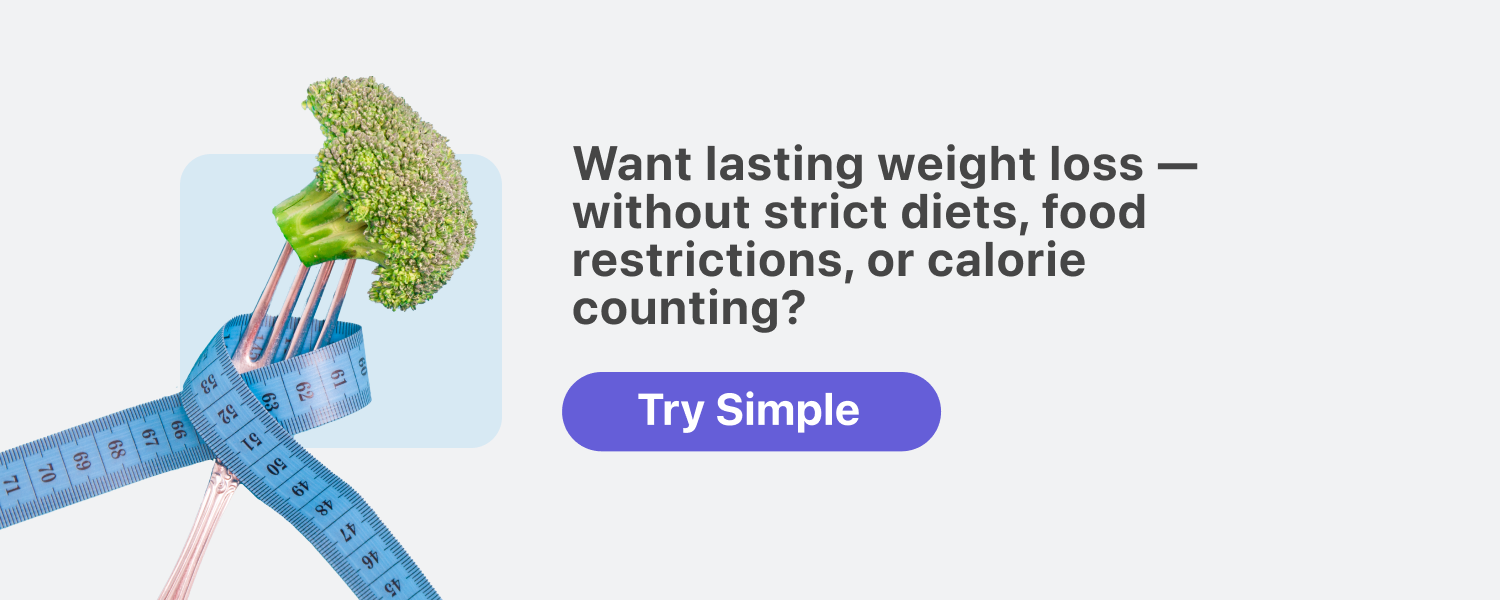
How to get enough protein as a vegetarian with intermittent fasting is done by including a variety of plant-based protein options such as tofu, tempeh, unsalted nuts and nut butters, legumes, seeds, and plant-based protein powders and aiming for at least two with every meal. If you choose to include them, you can also get protein from fish, dairy, and eggs.
Yes, you can intermittent fast on a plant-based diet. Remember, fasting is more about when you eat rather than what you eat. Whatever your diet choices, they can fit into a fasting schedule. A plant-based diet, when done well, is full of high-nutrient value foods that can further support your fasting efforts.
What a vegetarian should eat during intermittent fasting depends on the type of vegetarian you decide to be. Keep in mind that “vegetarian” + “ fasting” doesn’t automatically = healthy. You can still overeat, which is not a good thing if weight loss is one of your goals. Try to focus on whole, fresh foods more often than plant-based food alternatives.
How you break a prolonged fast as a vegetarian is with a balanced meal that includes protein (legumes, seeds, and nuts), fiber (fruits or vegetables), and complex carbohydrates (whole grains and starchy vegetables). Be sure to remember to stay hydrated.
Do lifelong vegetarians live longer depends on the individual. A vegetarian diet, when done well, can support life-preserving processes like preventing certain chronic diseases.[14] While living as a vegetarian can’t guarantee a longer life, it certainly doesn’t hurt.
